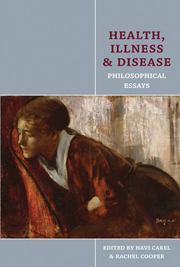Book contents
- Frontmatter
- Contents
- Acknowledgements
- Contributors
- Introduction
- Part I Concepts of health and disease
- Part II The experience of illness
- 5 What is phenomenology of medicine? Embodiment, illness and being-in-the-world
- 6 Beyond the wounded storyteller: rethinking narrativity, illness and embodied self-experience
- 7 Transitions in health and illness: realist and phenomenological accounts of adjustment to cancer
- 8 Pain as illness
- Part III Illness and society
- Bibliography
- Index
6 - Beyond the wounded storyteller: rethinking narrativity, illness and embodied self-experience
from Part II - The experience of illness
- Frontmatter
- Contents
- Acknowledgements
- Contributors
- Introduction
- Part I Concepts of health and disease
- Part II The experience of illness
- 5 What is phenomenology of medicine? Embodiment, illness and being-in-the-world
- 6 Beyond the wounded storyteller: rethinking narrativity, illness and embodied self-experience
- 7 Transitions in health and illness: realist and phenomenological accounts of adjustment to cancer
- 8 Pain as illness
- Part III Illness and society
- Bibliography
- Index
Summary
All of us participate in the making of narratives, but none of us can live wholly in narrative; none of us can even live very thoroughly in narrative. The lack of narrative is a kind of madness, but too much narrative is also a kind of madness. Perfect presence in the present is not recognizable as a human life, but perfect continual comprehensibility of the present in relation to the future is not recognizable as a human life.
(Sartwell 2000: 67)NARRATIVE IN THE FIELD OF MEDICINE
All disciplines tell stories of their emergence. These stories serve multiple functions: they assert disciplinary identity, lay claim to specific modes of scholarship and objects of scholarly inquiry, position the discipline within a broader field and provide a rationale for the on-going relevance of particular kinds of work. The medical humanities are no exception. If it were to be distilled into only a few sentences, the foundation story of the medical humanities would go something like this: During the twentieth century, biomedicine lost its way: the art and humanity of medical practice were lost to rapid scientific advances and new technologies. The medical humanities arose to demonstrate the value and relevance of the arts and humanities in making medicine and health care more humane.
- Type
- Chapter
- Information
- Health, Illness and DiseasePhilosophical Essays, pp. 113 - 128Publisher: Acumen PublishingPrint publication year: 2012



